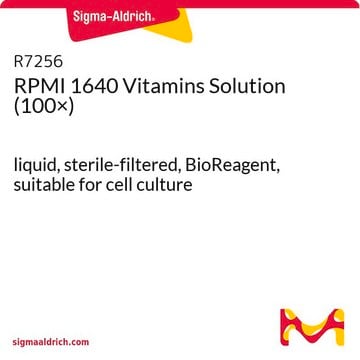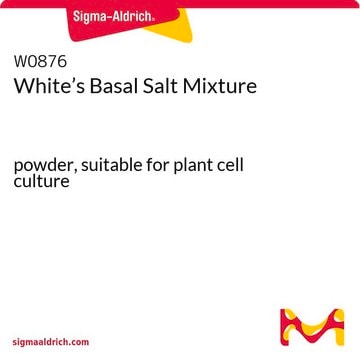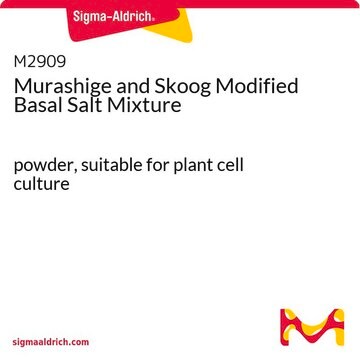G1019
Gamborg′s Vitamin Solution
1000 ×, liquid, suitable for plant cell culture
Synonym(s):
Gamborg Vitamin Solution, Vitamin Solution
Sign Into View Organizational & Contract Pricing
All Photos(1)
About This Item
UNSPSC Code:
10171502
NACRES:
NA.72
Recommended Products
sterility
sterile-filtered
Quality Level
form
liquid
concentration
1000 ×
technique(s)
cell culture | plant: suitable
color
colorless
pH
5.0-7.0
application(s)
agriculture
storage temp.
2-8°C
Application
Gamborg′ B-5 medium described by Gamborg, et al. may be purchased as a complete medium (G5893) or reconstituted from Vitamin 1000x (G1019) and Basal Salt Mixture (G5768) chemstocks. Use Gamborg′s B-5 (B5) medium for in vitro plant culture of cell lines and tissues such as of Taxus globosa, Splachnum ampullaceum Hedw, Linum album, Eucalyptus camaldulensis. Gamborg′s B-5 medium has been used for the culture of Annona squamosa callus.
Use at a concentration of one ml per liter of prepared medium to achieve the proper final concentration.
Components
Solution contains (mg/ml): 100.0 myo-inositol, 1.0 nicotinic acid, 1.0 pyridoxine hydrochloride, 10.0 thiamine hydrochloride.
related product
Product No.
Description
Pricing
Storage Class Code
12 - Non Combustible Liquids
WGK
WGK 3
Flash Point(F)
Not applicable
Flash Point(C)
Not applicable
Certificates of Analysis (COA)
Search for Certificates of Analysis (COA) by entering the products Lot/Batch Number. Lot and Batch Numbers can be found on a product’s label following the words ‘Lot’ or ‘Batch’.
Already Own This Product?
Find documentation for the products that you have recently purchased in the Document Library.
Customers Also Viewed
A N Sakamoto et al.
Plant signaling & behavior, 13(7), e1483673-e1483673 (2018-06-27)
Unrepaired DNA damage hinders the maintenance of genome integrity because it blocks the catalytic activity of replicase. The stalled replication fork can be processed through either translesion synthesis (TLS) with specific polymerases, or replication using the undamaged template. To investigate
Peng Zhao et al.
Developmental cell, 49(6), 882-893 (2019-05-14)
The maternal-to-zygotic transition (MZT) is an essential developmental turning point in both plants and animals. In plants, the timing of MZT and parental contributions to the zygotic transcriptome remain unclear. Here, by overcoming technical limitations, we characterize the Arabidopsis egg
R Mallon et al.
Cryo letters, 31(1), 24-28 (2010-03-24)
The source of germplasm as well as the technique used for storage of mosses can enhance survival after cryopreservation. Samples of gametophores, protonemata and protonemal brood cells from in vitro cultures of Splachnum ampullaceum were cryopreserved following exposure to a
Ashish Baldi et al.
Biotechnology letters, 30(9), 1671-1677 (2008-04-23)
Cell suspension cultures of Linum album were developed from internode portions of in vitro germinated plant in Gamborg's B5 medium supplemented with 0.4 mg naphthalene acetic acid/l. The highest biomass was 8.5 g/l with podophyllotoxin and 6-methoxypodophyllotoxin at 29 and
Li-Da Wang et al.
Journal of Asian natural products research, 4(3), 171-174 (2002-07-18)
Callus cultures of Annona squamosa were induced using different explants including petals, seed contents (megagametophyte and embryo) and fruits (mesocarp). Growth of the calli induced from the explants was found to be influenced by the type, concentration and ratio of
Our team of scientists has experience in all areas of research including Life Science, Material Science, Chemical Synthesis, Chromatography, Analytical and many others.
Contact Technical Service









